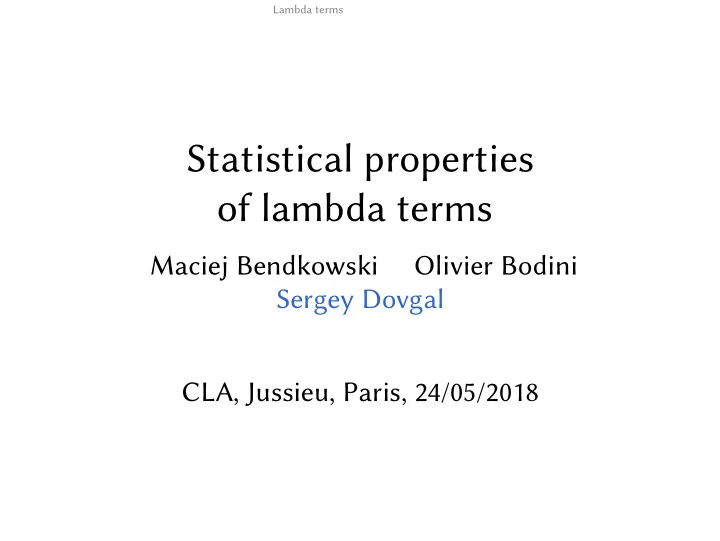

Lambda terms Historical overview Natural counting Variable size = unary distance to binding λ [Bendkowski, Grygiel, Lescanne, Zaionc ’12] [Bodini, Gitenberger, Gołe ¸biewski ’16] Enumeration and asymptotics :) Formal power series is convergent Uniform generation by Boltzmann sampling
Lambda terms Historical overview Natural counting Variable size = unary distance to binding λ [Bendkowski, Grygiel, Lescanne, Zaionc ’12] [Bodini, Gitenberger, Gołe ¸biewski ’16] Enumeration and asymptotics :) Formal power series is convergent Uniform generation by Boltzmann sampling
Lambda terms Historical overview Natural counting Variable size = unary distance to binding λ [Bendkowski, Grygiel, Lescanne, Zaionc ’12] [Bodini, Gitenberger, Gołe ¸biewski ’16] Enumeration and asymptotics :) Formal power series is convergent Uniform generation by Boltzmann sampling
Lambda terms Historical overview Natural counting Variable size = unary distance to binding λ [Bendkowski, Grygiel, Lescanne, Zaionc ’12] [Bodini, Gitenberger, Gołe ¸biewski ’16] Enumeration and asymptotics :) Formal power series is convergent Uniform generation by Boltzmann sampling
Lambda terms Historical overview Why consider a simpler model?
Lambda terms Historical overview Why consider a simpler model? Main reason : advantages in random generation
Lambda terms Historical overview Why consider a simpler model? Marking variables imply control over expectations
Lambda terms Historical overview Why consider a simpler model? Another reason : parameter study
Lambda terms Historical overview Why consider a simpler model? Marking variables allow to study distributions
Lambda terms Statistical properties Chapter 2. Statistical properties
Lambda terms Statistical properties
Lambda terms Statistical properties Plain lambda terms
Lambda terms Statistical properties Generating function for plain lambda terms λ @ L = + + D L L L z L ( z ) = zL ( z ) + zL 2 ( z ) + 1 − z
Lambda terms Statistical properties Abstractions in plain terms? λ @ = D L + + L L L z L ( z , u ) = zuL ( z , u ) + zL ( z , u ) + 1 − z � z L ( z , u ) ∼ a ( z , u ) − b ( z , u ) 1 − ρ ( u )
Lambda terms Statistical properties Multivariate Central Limit Theorem
Lambda terms Statistical properties Step 1 . Extract coefficient of L ( z , u )
Lambda terms Statistical properties � z L ( z , u ) ∼ a ( z , u ) − b ( z , u ) 1 − ρ ( u )
Lambda terms Statistical properties Step 2 . Asymptotic behaviour of probability generating function
Lambda terms Statistical properties p n ( u ) ∼ A ( u ) B ( u ) n
Lambda terms Statistical properties Step 3. Gaussian approximation from A ( u ) B ( u ) n .
Lambda terms Statistical properties Applying multivariate CLT Theorem Joint Gaussian distribution for number of abstractions number of variables number of redexes in plain lambda terms
Lambda terms Statistical properties Discrete distributions in plain terms
Lambda terms Statistical properties Head abstractions H H L ∞ = + D @ L ∞ | u = 1 L ∞ | u = 1 � � 1 z 1 − z + zL ( z , 1 ) 2 L ( z , u ) = 1 − zu
Lambda terms Statistical properties Theorem The following statistics follow discrete (geometric) limiting distributions The number of head abstractions Randomly chosed value of de Bruijn index
Lambda terms Infinite systems Chapter 3. Infinite systems
Lambda terms Infinite systems Drmota–Lalley–Woods theorem
Lambda terms Infinite systems Drmota–Lalley–Woods theorem Let F ( z ) be a generating function Suppose it satisfies F ( z ) = Φ( F ( z ) , z ) with Φ having combinatorial origin Then, � 1 − z F ( z ) ∼ a − b ρ
Lambda terms Infinite systems Drmota–Lalley–Woods theorem Let F ( z ) be a generating function Suppose it satisfies F ( z ) = Φ( F ( z ) , z ) with Φ having combinatorial origin Then, � 1 − z F ( z ) ∼ a − b ρ
Lambda terms Infinite systems Drmota–Lalley–Woods theorem Let F ( z ) be a generating function Suppose it satisfies F ( z ) = Φ( F ( z ) , z ) with Φ having combinatorial origin Then, � 1 − z F ( z ) ∼ a − b ρ
Lambda terms Infinite systems What happens with infinite systems?
Lambda terms Infinite systems [Drmota, Gitenberger, Morgenbesser ’12] If Jacobian is a sum of identity matrix and a compact operator And specification is strongly connected Then Infinite-dimensional version holds
Lambda terms Infinite systems Closed lambda terms satisfy an infinite system
Lambda terms Infinite systems L 0 ( z ) = zL 1 ( z ) + zL 0 ( z ) 2 , L 1 ( z ) = zL 2 ( z ) + zL 1 ( z ) 2 + z , L 2 ( z ) = zL 3 ( z ) + zL 2 ( z ) 2 + z + z 2 , . . . z L ∞ ( z ) = zL ∞ ( z ) + zL ∞ ( z ) + 1 − z .
Lambda terms Infinite systems Why?
Lambda terms Infinite systems Adding m abstractions on the top of L m makes the term closed
Lambda terms Infinite systems Example.
Lambda terms Infinite systems Example. λ @ 0 λ @ @ @ 1 0 0 3
Lambda terms Infinite systems λ @ L m D m = + + L m + 1 L m L m m ( z ) + z 1 − z m L m ( z ) = zL m + 1 ( z ) + zL 2 1 − z
Recommend
More recommend